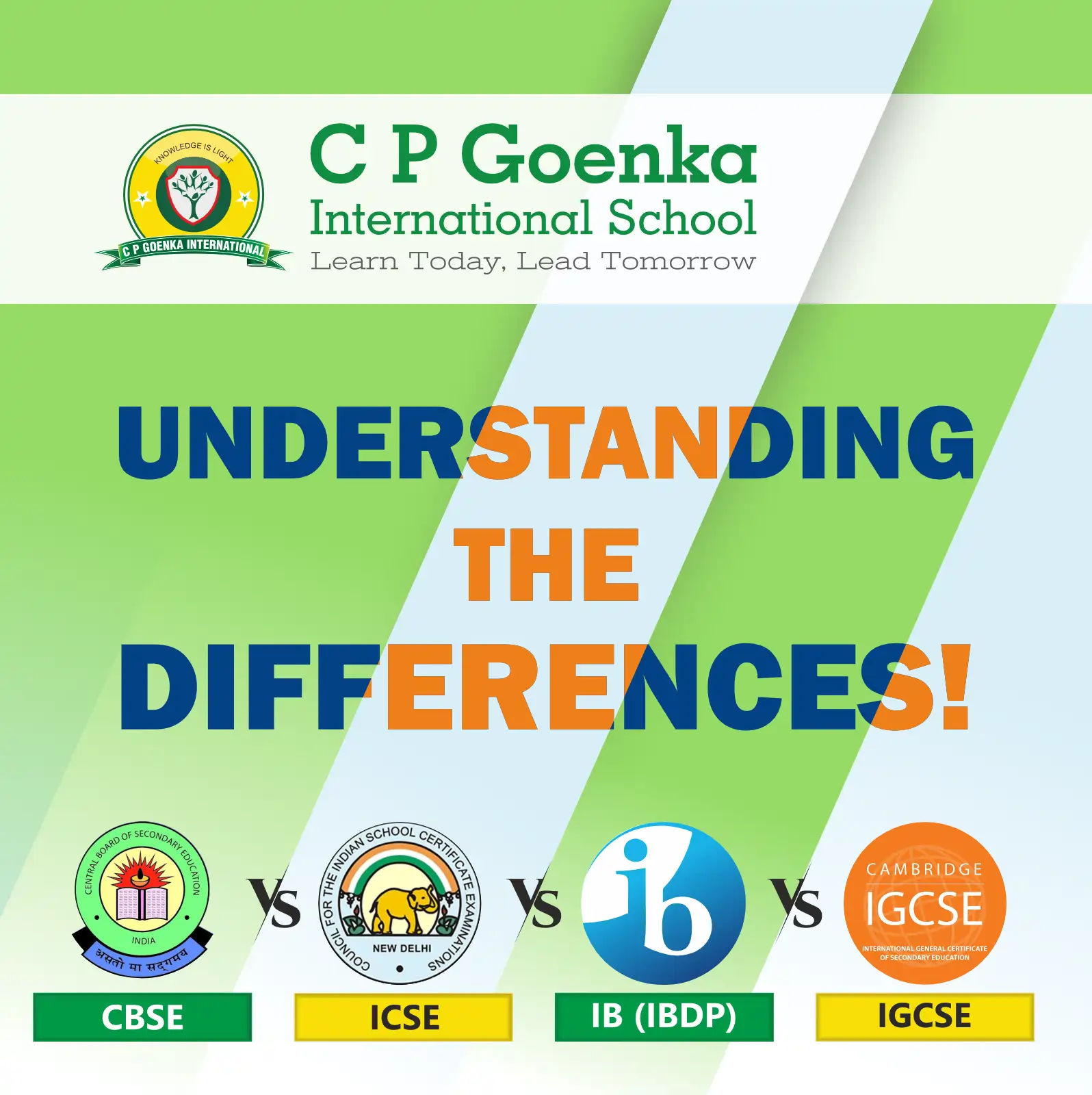
To Top
CBSE vs. ICSE vs. IB vs. IGCSE: Navigating India's Education Boards
Selecting an education board shapes the trajectory of a student's academic journey, especially for those eyeing international studies. India presents four prominent education systems—CBSE, ICSE, IGCSE, and IB—each with distinct offerings. This guide examines their curricula, teaching methods, assessments, university recognition, and skill-building prospects. Deciphering these systems empowers students and parents to align educational choices with future aspirations.
The right education system serves as a cornerstone for Indian students aspiring to pursue international studies. This concise guide outlines the nuances of CBSE, ICSE, IGCSE, and IB, aiding in informed decisions vital for a successful academic pursuit abroad.

You will be aware that some IB schools in Mumbai have come up along with the rest of India. Let us explore the various education boards in India and choose which is best for students to follow:
Let us begin with the CBSE board first:
CBSE Board
The Central Board of Secondary Education (CBSE) stands out for its widespread recognition within India. It's known for its structured curriculum that prioritizes subjects like math, science, and language. The board emphasizes the development of analytical thinking and problem-solving abilities among students. CBSE conducts standardized exams like the AISSE (All India Secondary School Examination) and AISSCE (All India Senior School Certificate Examination) in Classes 10 and 12, respectively. The board encourages a comprehensive learning approach and offers a balanced curriculum to prepare students for various competitive exams and higher education opportunities.
Advantages
CBSE stands out for its global recognition, simplifying admissions to international universities. Its emphasis on core subjects like science and math ensures a solid foundation, making it ideal for diverse undergraduate programs abroad. Moreover, the curriculum's focus on competitive exams like JEE and NEET, along with affordability, makes CBSE a practical choice, preparing students for higher education opportunities worldwide at a more accessible cost.
Disadvantages
The CBSE Board, while recognized, presents limitations. Its focus on Indian perspectives may hinder exposure to global issues because it lacks diverse viewpoints. Conventional teaching methods might not align with interactive approaches favored internationally. Additionally, the curriculum's limited emphasis on soft skills and fewer extracurricular opportunities may pose challenges for students aiming to excel in the global education landscape.
ICSE Board
ICSE, governed by CISCE, provides a balanced curriculum emphasizing languages, science, and the humanities. Its focus on concept clarity, analytical skills, and experiential learning through projects and field trips prepares students for diverse fields. With over 2,000 schools, ICSE is renowned for high academic standards and a comprehensive educational approach blending traditional and modern teaching methodologies.
Advantages
ICSE's balanced curriculum prepares students for diverse global undergraduate programs. Its focus on critical thinking and strong English proficiency prepares them for success abroad. Recognized internationally, ICSE certifications ease admission processes to universities overseas, giving Indian students a competitive edge. This holistic approach emphasizing analytical skills and language fluency is beneficial for navigating international education landscapes.
Disadvantages
ICSE's strengths, however, come with limitations. It lacks focus on standardized test preparation like the SAT and ACT, requiring students to seek additional resources. While providing a balanced curriculum, ICSE might not offer extensive exposure to global perspectives, unlike IGCSE and IB. Its rigorous workload could challenge students juggling preparations for studying abroad, potentially limiting extracurricular engagement vital for well-rounded university applications.
IGCSE Board
Cambridge IGCSE assessments blend formative (like classwork and projects) and summative evaluations (final exams). Internal assessments by schools complement external exams by the examination board (e.g., Cambridge). Final grades weigh external exam scores with internally assessed coursework or practicals. This holistic approach evaluates students' knowledge, understanding, application, and practical skills, ensuring a comprehensive evaluation for IGCSE students.
Advantages
Cambridge IGCSE boasts international recognition, easing admissions for Indian students at global universities. Its flexible curriculum aligns with varied interests and career paths, laying a strong foundation for further studies abroad. Emphasizing critical skills like problem-solving and communication, Cambridge IGCSE prepares students for the global job market. Additionally, its focus on global awareness fosters cultural adaptability, ideal for thriving in diverse international academic environments.
Disadvantages
Cambridge IGCSE schools generally carry higher fees, limiting accessibility compared to CBSE and ICSE-affiliated schools. While offering a global perspective, IGCSE might lack depth in the Indian context, which is crucial for students returning to India. Students may require additional preparation for standardized tests like the SAT and ACT, which is not a primary focus of IGCSE. Moreover, the limited number of IGCSE schools in India might restrict access for some students.
IB Board
The International Baccalaureate (IB), established by the IBO in 1968, is a globally renowned education program encompassing the Primary Years Programme (PYP), Middle Years Programme (MYP), and Diploma Programme (DP). IB's holistic approach fosters intellectual, personal, and social growth, emphasizing interdisciplinary learning and critical thinking. With 150+ schools in India, IB prepares students for international universities, promoting a well-rounded education for success in diverse, global environments.
Advantages
IB offers global recognition, aiding Indian students in securing spots at prestigious global universities. Its holistic education approach develops personal, social, and academic skills ideal for multicultural adaptation abroad. Emphasizing critical thinking and problem-solving, IB prepares students for success in international education and the global job market. Moreover, its focus on global awareness fosters cultural understanding and adaptability, which are advantageous for thriving in diverse international academic environments.
Disadvantages
IB schools often have higher fees, limiting accessibility. Its demanding workload might challenge students, especially when preparing to study abroad. While offering a global outlook, IB might lack depth in the Indian context, which is crucial for students planning to return. The limited availability of IB schools restricts access for some Indian students.
So which board should students choose?
CBSE and ICSE boards, while more cost-effective, may limit Indian students' global opportunities due to their focus on Indian contexts. They offer strong foundations but lack the comprehensive global perspective of the IB curriculum, potentially affecting adaptability in international settings. However, these boards excel in Indian-centric education, which is crucial for students planning to return. With broader availability, CBSE and ICSE cater to a larger Indian student population, offering quality education within an Indian context.
Cambridge IGCSE & IB schools offer a globally recognized curriculum, propelling Indian students towards prestigious international universities. Despite higher fees, the holistic IGCSE & IB approach prepares students for diverse academic challenges worldwide. While lacking in the Indian context, its emphasis on critical skills and global awareness fosters adaptability. Although limited, the growing number of IGCSE & IB schools in India provides a pathway for well-rounded education and success in global environments.
Conclusion
It is in line with this that some of the best international schools in Mumbai, as well as the best international schools in Pune, now follow the IGCSE or IB board. Thus, if you are based in Mumbai, it is best that you choose the top International schools in Mumbai.











